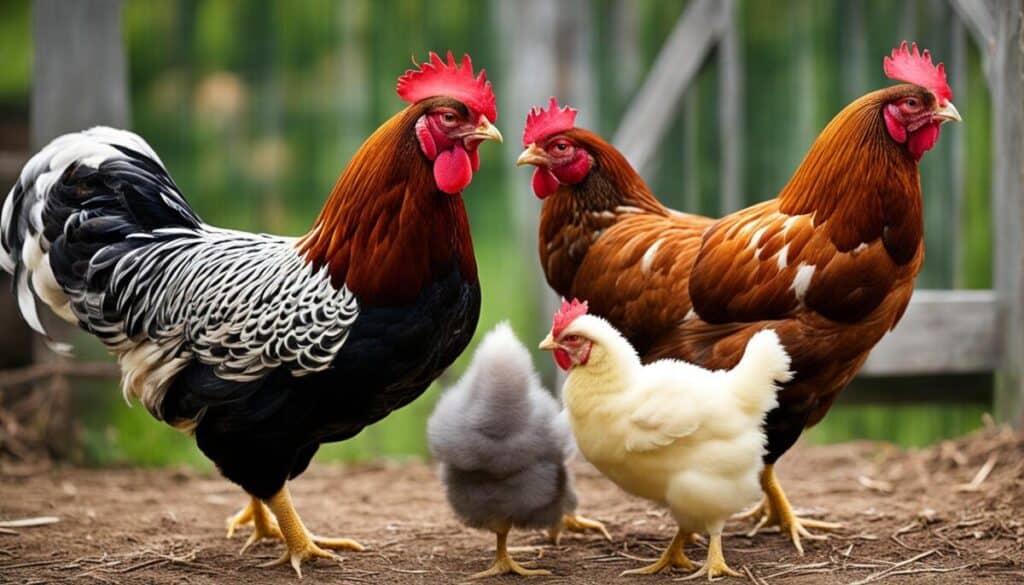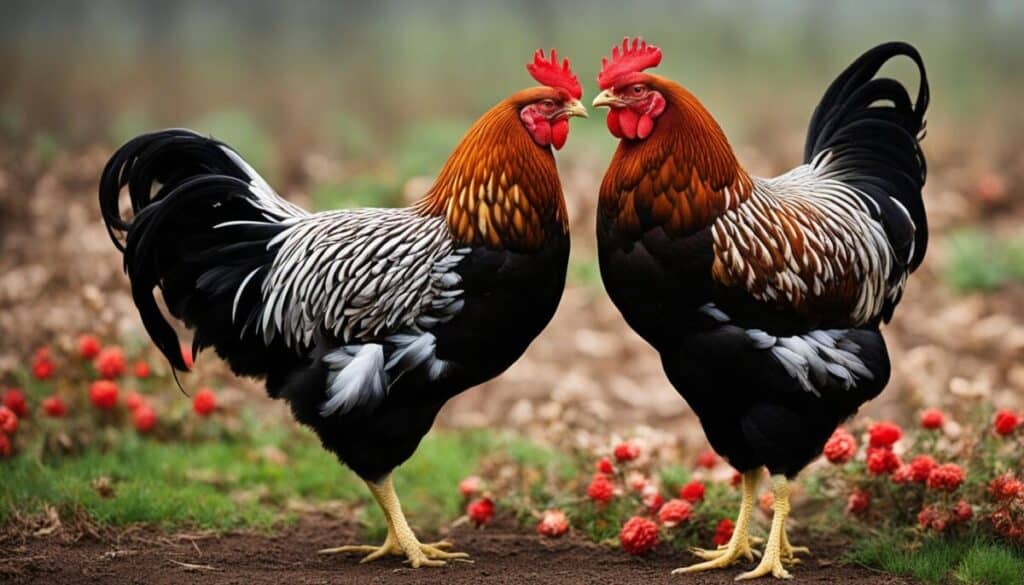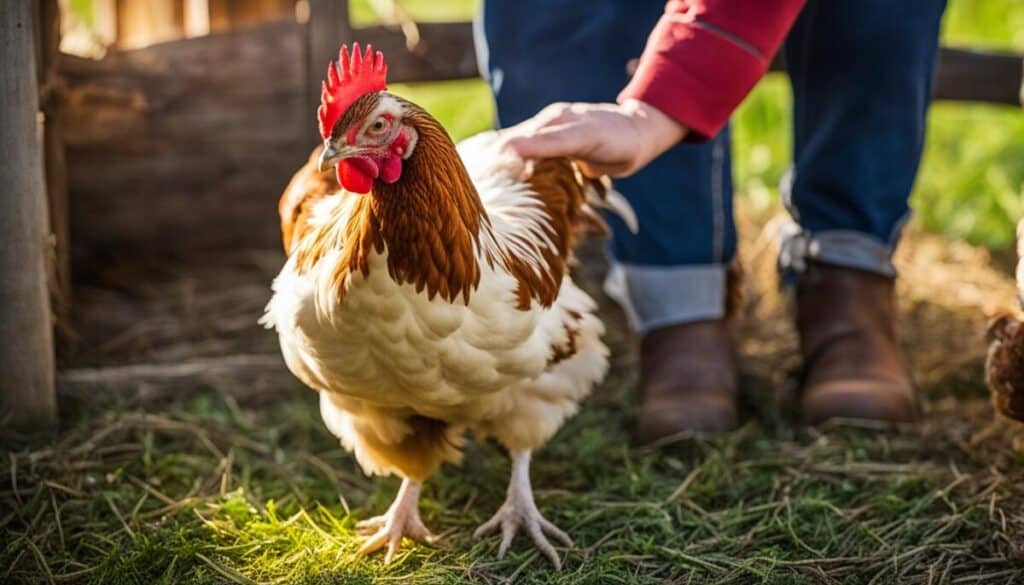Whether you’re a seasoned chicken keeper or a newcomer, Wyandotte chickens are a delightful breed to add to your backyard flock. These charming birds come in a variety of breeds and feature unique characteristics that set them apart from other chicken breeds. From their easy-going temperament and adaptability to various climates to their reliable egg production and captivating colors, Wyandotte chickens offer many benefits to backyard enthusiasts.
In this comprehensive guide, we explore everything you need to know about Wyandotte chickens, including their breeds, characteristics, care guidelines, egg production, history, and more. Join us on a journey through the world of Wyandotte chickens and discover why these birds are a favorite among chicken keepers.
Key Takeaways
- Wyandotte chickens make an excellent addition to backyard flocks due to their friendly temperament and reliable egg production.
- There are several breeds of Wyandotte chickens, each with its unique characteristics and appearances.
- Proper care practices, including feeding, housing, predator protection, and health maintenance, are crucial for ensuring the well-being of Wyandotte chickens.
- Wyandotte chickens come in a wide array of colors, providing a charming addition to any backyard flock.
- Raising Wyandotte chicks requires special attention and care to ensure healthy development and growth.
Wyandotte Chicken Breeds: Varieties and Differences
Wyandotte chickens, although not the smartest breed, offer a variety of breeds to choose from, each with their unique set of characteristics and appearances, making them a popular choice among chicken enthusiasts. In this section, we will examine the different Wyandotte chicken breeds and highlight their physical attributes, temperaments, and egg-laying abilities.
| Breed | Appearance | Temperament | Egg-Laying Abilities |
|---|---|---|---|
| Black Wyandotte | https://www.youtube.com/watch?v=-gq6VqiumYM | Friendly, calm, and easy to handle | Produces around 200 eggs per year |
| Blue Wyandotte | Gray-blue feathers with a lacy pattern, blue legs and skin. | Gentle and docile | Produces around 180 eggs per year |
| Silver Laced Wyandotte | Black feathers with white edging, teal legs, and skin. | Quiet and non-aggressive | Produces around 200 eggs per year |
| Partridge Wyandotte | Brown-red feathers with black and white stripes and yellow legs and skin. | Active and curious | Produces around 180-200 eggs per year |
The above breeds are just a few examples of the variety the Wyandotte chicken breeds have to offer. While their differences may seem subtle, they add to the charm and diversity of these backyard birds. Whether you prefer a particular egg color, appearance, or temperament, there is a Wyandotte chicken breed for everyone.
Wyandotte Chicken Characteristics: What Sets Them Apart
Wyandotte chickens are unique and stand out among other chicken breeds due to their distinct physical features, docile disposition, and adaptability to various climates. Here are some of the characteristics that make them special:
| Physical Features | Docile Nature | Adaptability |
|---|---|---|
| Wyandotte chickens have a rose comb, which is a low comb that helps prevent frostbite during colder temperatures. They also have round, fluffy bodies, making them look like little puffballs, and come in a variety of colors. | These chickens are friendly, calm, and easy to handle. Their docile nature makes them an excellent choice for families with children or novice chicken keepers. | Wyandottes are hardy birds that can adapt to different climates, making them suitable for backyard enthusiasts in various regions. They can handle both heat and cold and are known for their ability to forage well. |
Overall, Wyandotte chickens make an excellent addition to any backyard flock due to their unique and appealing characteristics.
Wyandotte Chicken Care: Tips for Raising Healthy Chickens
Wyandotte chickens are hardy birds that require minimal maintenance but still need proper care to thrive. Follow these essential tips to ensure the health and happiness of your flock:
Feeding:
Provide a well-balanced diet that includes a mix of commercial feed, grains, and kitchen scraps. Offer fresh water daily and ensure the feeders are clean and dry to prevent mold growth.
Housing:
Provide a secure and spacious coop, with ample space for roosting, nesting, and moving around. Ensure proper ventilation and insulation for temperature regulation. Regularly clean and disinfect the coop to prevent health issues.
Predator Protection:
Install fencing and wire mesh around the coop to prevent predator attacks. Cover all openings, including windows and doors, to keep predators out.
Tip: Consider using motion-activated lights or alarms to deter predators and protect your flock.
Health Maintenance:
Regularly examine your Wyandotte chickens for signs of illness or injury, including feather loss, lethargy, or abnormal droppings. Provide access to grit and oyster shells to aid digestion and eggshell formation. Vaccinate your flock against common diseases and parasites.
Overall Care Guidelines:
- Provide adequate space, light, and access to the outdoors.
- Monitor the flock’s behavior and adjust care as necessary.
- Handle chickens gently and avoid overcrowding.
- Regularly trim their beaks and nails to prevent overgrowth.
Common Health Issues in Wyandotte Chickens
| Health Issue | Symptoms | Treatment |
|---|---|---|
| Respiratory infections | Coughing, sneezing, wheezing, nasal discharge | Antibiotics, supportive care |
| Parasites (lice, mites, worms) | Excessive scratching, feather loss, weight loss, diarrhea | Parasiticides, dewormers, hygiene management |
| Fatty liver disease | Lethargy, loss of appetite, sudden death | Dietary changes, supportive care |
By following these care tips and monitoring your Wyandotte chickens regularly, you can raise healthy and happy birds that will provide you with years of enjoyment.
Wyandotte Chicken History: From Origins to Present
Wyandotte chickens have a rich history dating back to the 19th century. The breed originated in the United States, where they were developed in upstate New York around 1870 by crossing several breeds, including the Silver Sebright, the Dark Brahma, and the Spangled Hamburg.
The first Wyandotte chickens were exhibited at the Massachusetts Poultry Association show in 1883, and they quickly became a popular breed among poultry enthusiasts. In the early 20th century, Wyandotte chickens played a significant role in the commercial poultry industry, with thousands of chickens being raised for meat and eggs.
Despite a decline in commercial production in the mid-20th century, Wyandotte chickens remain a beloved breed for backyard enthusiasts and exhibition breeders. Their hardiness, adaptability, and striking appearance have secured their place in the poultry world.
The Royal Windsor Show
“Wyandotte chickens excelled in many areas of the show, and their beauty and usefulness have made the breed a favorite of ours.”
Since their creation, Wyandotte chickens have been a fixture in many poultry shows and competitions. In 1898, the breed was officially recognized by the American Poultry Association and has since become a favorite in the exhibition world.
| Year | Event | Winning Wyandotte |
|---|---|---|
| 1905 | The Royal Windsor Show | Wheeler & Lockwood’s Silver Laced Wyandotte hen |
| 1922 | The New York State Fair | George Kennedy’s White Wyandotte hen |
| 1964 | The Ohio National | Paul Smith’s Partridge Wyandotte cockerel |
From their humble beginnings to their widespread popularity today, Wyandotte chickens have left a lasting impression on the poultry world. Whether you’re raising them for eggs, meat, or exhibition purposes, their unique history makes them a fascinating breed to have in your backyard flock.
Wyandotte Chicken Colors: A Rainbow of Options
Wyandotte chickens are known for their stunning array of colors and patterns, with each breed presenting a unique combination of hues. From the classic silver-laced to the breathtaking blue, these birds offer a wide range of options to choose from when designing your flock.
Here are some of the most popular Wyandotte chicken colors:
| Color | Description |
|---|---|
| Silver Laced | A black and white color pattern with a lacy silver edging on the feathers. |
| Gold Laced | A deep reddish-brown pattern with black lacing on the feathers. |
| Blue | A soft blue-grey color with darker blue lacing on the feathers. |
| Black | A solid, rich black color with a glossy sheen to the feathers. |
| Buff | A warm, golden-brown hue reminiscent of autumn leaves. |
| Partridge | A striking pattern featuring dark and light brown feathers with black lacing. |
| Splash | A whimsical color pattern featuring pale blue-grey spots on a white background. |
No matter which Wyandotte chicken color you choose, these birds are sure to add vibrancy and charm to your backyard flock.
Wyandotte Chicken Temperament: Friendly and Calm
Wyandotte chickens are renowned for their friendly and calm dispositions, making them an ideal choice for families and individuals alike. Unlike other chicken breeds, Wyandottes are easy to handle and socialize with, making them a popular choice for backyard flocks.
Their docile nature is ideal for those new to raising chickens, as they require little additional effort or training to become well-behaved. Wyandottes are also sociable birds that enjoy the company of their flock and humans, making them a joy to have around the homestead.
When considering a Wyandotte for your flock, you can expect a bird that is tolerant of other breeds and animals, making them a versatile addition to the coop.
“Wyandotte chickens are a joy to have in any backyard flock. Their calm and sociable nature makes them easy to handle, and they get along well with other birds and animals.”
Wyandotte Chicken Eggs: Production and Quality
Wyandotte chickens are known for their ability to produce high-quality eggs, making them a popular choice for backyard enthusiasts. These birds can lay around 200-280 eggs per year, with each egg weighing approximately 55-60 grams.
The eggs produced by Wyandotte chickens are not only plentiful but also of excellent quality. They boast a well-formed shape with a strong and durable shell that protects the delicate interior. The yolk is bright and flavorful, while the albumen (egg white) is thick and rich, making them excellent for cooking and baking.
When it comes to nesting habits, Wyandotte hens are known to be excellent mothers, diligently tending to their nests and eggs. They have a strong maternal instinct that helps ensure the eggs remain healthy and viable during the incubation period.
Overall, Wyandotte eggs are not only aesthetically pleasing but also nutritionally dense and flavorful, making them an excellent addition to any kitchen.
Wyandotte Chicken Rooster: Characteristics and Functions
Roosters are an integral part of any Wyandotte chicken flock. Aside from their obvious physical differences, they possess unique characteristics and functions essential for a healthy and successful flock.
Physical Appearance
Wyandotte chicken roosters, like all roosters, are larger and more robust than hens. They usually exhibit vibrant combs, wattles, and earlobes, with striking, colorful plumage. Their tails are long and feathery, making them easily distinguishable from hens.
Behavior and Temperament
Wyandotte roosters are generally known for their calm and friendly dispositions, making them easy to handle. They are protective of their flock, vigilant against predators, and will actively warn and defend their hens against any potential threats.
“Wyandotte roosters are like the watchful guardians of the flock, fiercely committed to the safety and well-being of their hens.”
Functions within the Flock
Roosters play various roles within a Wyandotte chicken flock. One of their primary functions is to fertilize eggs, ensuring healthy breeding. Roosters also assist with flock management, helping to maintain a structured hierarchy and settling disputes among hens.
Wyandotte Chicken Hens: The Backbone of the Flock
When it comes to the Wyandotte chicken flock, the hens are the unsung heroes. Not only do they provide a crucial role in egg production, but they also play a significant part in fostering a harmonious social structure. Wyandotte hens are known for their docile, friendly natures, making them easy to handle and ideal for families.
Maternal instincts are at the core of a Wyandotte hen’s personality. Their broodiness and nurturing nature make them excellent mothers, fiercely protective and attentive to their chicks.
Furthermore, hens assume a crucial role in the flock hierarchy, establishing a pecking order that ensures everyone’s needs are met and helps maintain order. They communicate through a range of vocalizations, indicating their moods and intentions. The communication goes beyond vocalization, as they also use non-verbal cues such as posturing and feather fluffing.
The Role of Wyandotte Chicken Hens
Wyandotte chicken hens perform essential duties within the flock. They are instrumental in establishing and maintaining social order, ensuring that everyone has access to food and clean water. Additionally, they assist in keeping the coop clean by scratching at the ground to find bugs and insects, keeping the coop floor aerated in the process.
Moreover, hens are responsible for laying the eggs that serve as the backbone of any backyard chicken flock. They provide a consistent supply of fresh, delicious eggs with remarkable shell strength that is difficult to match with other breeds. Plus, they continue to lay eggs even as they age, making them an excellent addition to any infrastructure.
Wyandotte hens have an average lifespan of around six years, with their egg production starting around five months of age and continuing through the rest of their lives. It’s important to make sure that they have regular access to proper food, water, and shelter, ensuring their optimum health and well-being.
“Wyandotte hens are the backbone of any Wyandotte chicken flock, contributing not only to egg production but fostering a harmonious social structure.”
Caring for Wyandotte Chicks: A Delicate Endeavor
Raising Wyandotte chicken chicks is a rewarding experience that requires special attention and care. As these young birds are delicate, it’s important to have the proper setup and practices to ensure their health and safety during the critical developmental stage.
Brooding Requirements
Brooding is the process of providing warmth, shelter, and food for young chicks. For Wyandotte chicks, a brooder box or area is necessary with a heat source that maintains a temperature of around 95 degrees Fahrenheit for the first week of life. As they grow, the temperature can be gradually reduced. The brooder area should also have a clean, litter-lined floor and be large enough to provide ample space for the chicks to move around.
Feeding
Wyandotte chicks require a balanced diet of starter feed that is high in protein to support their growth and development. It’s best to provide food in several small meals throughout the day, rather than leaving a large feeder out at all times. Fresh, clean water should also be available at all times, and the waterer should be cleaned and refilled daily.
Development Milestones
As Wyandotte chicks grow, they reach important developmental milestones. At around 2-3 weeks of age, they begin to feather out, and their heat source can be gradually reduced. At around 4-6 weeks, they are old enough to move to a larger coop with outdoor access. It’s important to monitor their behavior during this transition to ensure they are adjusting well. By 16-20 weeks, Wyandotte chicks will begin to lay eggs, and at this point, they can be considered fully grown.
Conclusion
Wyandotte chickens are a delightful breed that offers a perfect blend of beauty, temperament, and utility. From their striking appearance and calm demeanor to their reliable egg laying, Wyandotte chickens are an excellent choice for backyard enthusiasts of all levels.
In this guide, we have covered everything from the various breeds and unique characteristics of Wyandotte chickens to essential care tips, egg-laying habits, and more. We hope this comprehensive guide has provided valuable insights into these charming birds and that it will help you care for your flock.
Whether you are looking to add Wyandotte chickens to your existing flock or starting a new one, these birds are sure to bring joy and entertainment to your backyard. Thank you for taking the time to read this guide, and we wish you all the best in your chicken-raising endeavors!
FAQ
What are the different breeds of Wyandotte chickens?
Wyandotte chickens come in various breeds, including Silver Laced, Gold Laced, Blue Laced Red, Buff, Black, White, Columbian, Partridge, and Silver Penciled.
What are the unique characteristics of Wyandotte chickens?
Wyandotte chickens are known for their docile nature, adaptability to different climates, sturdy build, and beautiful feather patterns.
How should I care for Wyandotte chickens?
To care for Wyandotte chickens, ensure they have a balanced diet, a secure and spacious coop, regular health check-ups, protection from predators, and access to fresh water and clean bedding.
What is the history of Wyandotte chickens?
Wyandotte chickens originated in the United States in the 19th century and were initially bred for their utility, hardiness, and meat quality. Today, they are cherished for their ornamental value and egg-laying capabilities.
What colors are available in Wyandotte chickens?
Wyandotte chickens come in a range of colors, including silver laced, gold laced, blue, black, white, buff, partridge, Columbian, and silver penciled.
Are Wyandotte chickens friendly?
Yes, Wyandotte chickens have friendly and calm temperaments, making them great pets and suitable for families.
How many eggs do Wyandotte chickens lay?
Wyandotte hens typically lay about 200-220 brown eggs per year, depending on the individual and environmental factors.
What are the characteristics of Wyandotte roosters?
Wyandotte roosters are known for their striking appearance, protective nature, and leadership within the flock.
What role do Wyandotte hens play in the flock?
Wyandotte hens are essential for egg production and contribute to maintaining a harmonious social structure within the flock.
How do I care for Wyandotte chicks?
When raising Wyandotte chicks, provide them with a warm brooder, balanced chick feed, clean water, and a safe environment free from predators.






